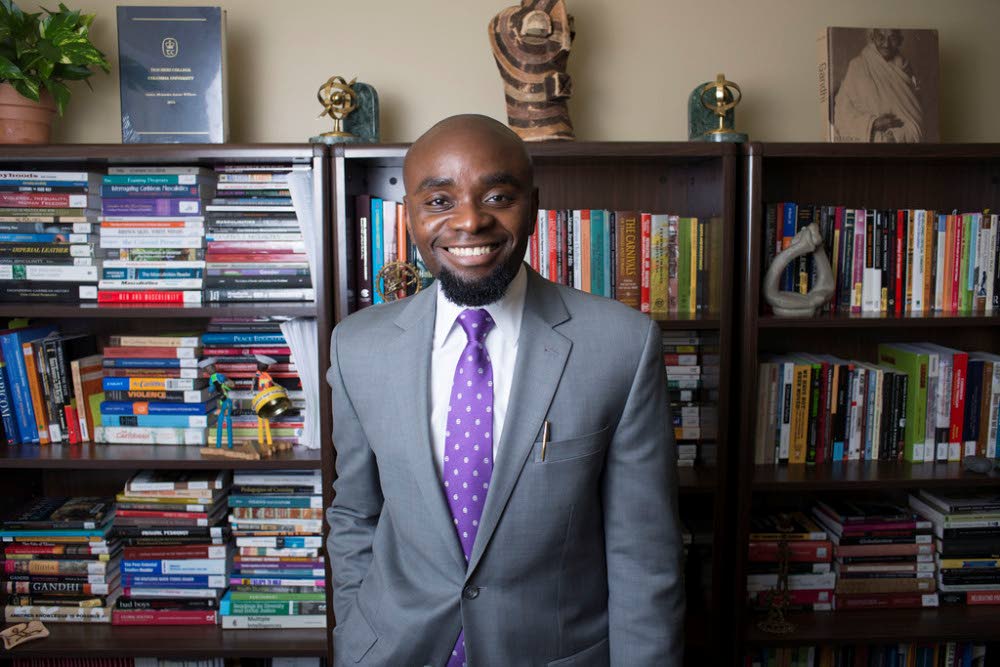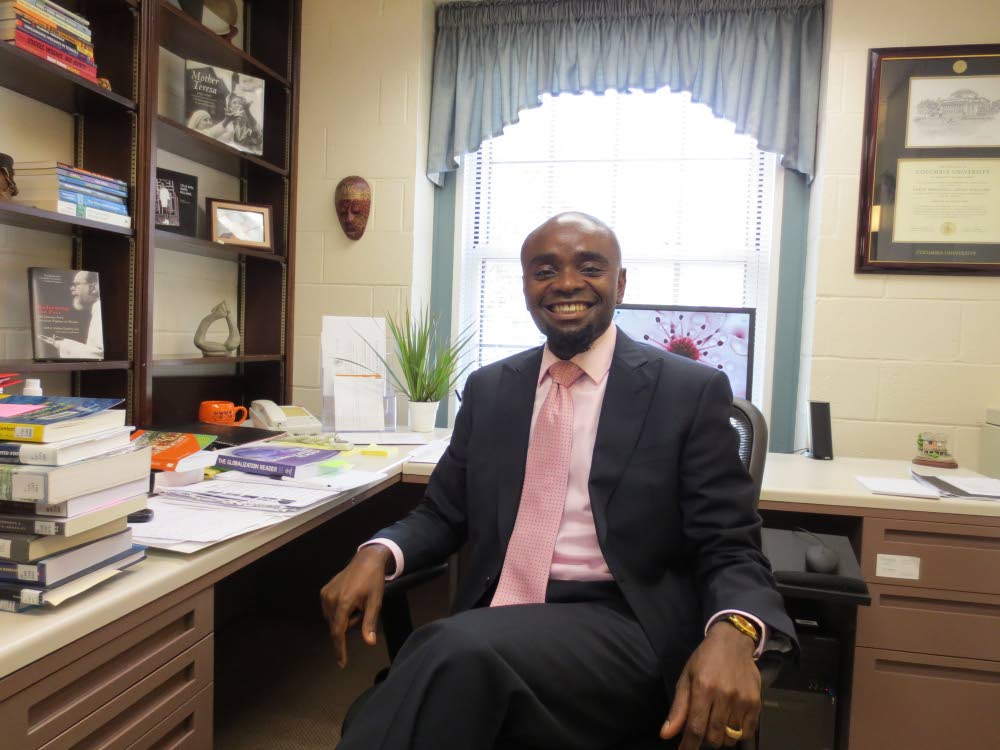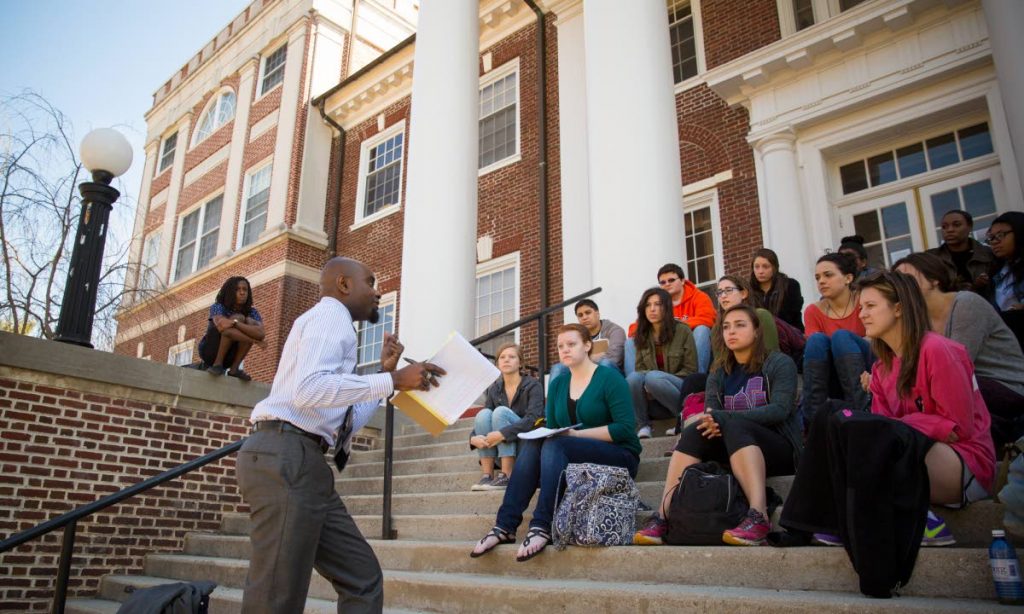‘I am where I am supposed to be’

Dr Hakim Mohandas Amani Williams, 40, remembers growing up at 107 Laventille Road, at the intersection of Belgrade Street, “close to the springs.”
He lived there with his grandmother and mother until his second brother came along when he was nine. All four of them slept in one bed, in two small rented rooms in a house with other tenants and a shared outdoor toilet.
Williams’s mother got pregnant at 16 and had him at 17. She dropped out of high school.
Both his mother and grandmother, Williams said in an interview, had very little education and that made them “insistent” on his getting one. He remembered bringing home a B+ one time: his mother told him never to do that again, and threatened him
Today, that insistence has paid off. He has a BA in psychology from St Francis College, a masters in international educational development with a focus on peace education from Columbia University, and a masters in education, also from Columbia. His doctorate is in international educational development with a focus on peace education.
Williams wants to share his story with others and hopes to help change TT’s educational system.
Laventille was home to him, but it felt “obviously scary then” hearing “a little gunshots ever so often.”
When he sat the Common Entrance exam he passed for his fourth choice, Tranquillity Government Secondary School, but after two weeks he transferred to Woodbrook Secondary.
He and his family were somewhat suspicious that his being from Laventille led to his not getting into his top schools of choice.

After form one, he sat an entrance exam for Queen’s Royal College, got in, and completed his secondary education there. He believes had he gone there straight away he would not have had “the disposition to critique the system.”
At 18, he left for the US to meet his mother, who had migrated when he was nine. He got into Morehouse College, a private, historically black men’s college, and spent one semester there.
His mother was working as a nurses’ aide in New York, which did not pay much, and by the time he arrived in the US, she also had another son.
Williams started Morehouse with no financial aid, but despite a partial scholarship, he could not afford to stay, so in January 1999 he transferred to St Francis College, New York.
There he felt more comfortable, as there were a lot of other Trinidadians, and he got a partial scholarship. His mother came to him to ask if he had enough money to cover all his costs, and he said there was a shortfall of US$1,000.
She replied, “Oh gosh, I can’t pay that.” Then, he said, she went to the college and “buss some tears.”
“They pull her in an office and say, ‘We will give you the money for this year, but next year you need to find the money,’” he said, with a slight laugh.
She came back to him saying, “‘Hakim, they put me in an office because I threatened to strip down and call on Jesus. And they said, ‘No need to do all this madness.’”
His mother then asked if he was good now and he said yes – but he needed money for books: about US$300-$500 a semester.
“She said, ‘Lord have mercy.’
“I said ‘Don’t do anything else.’
“Two hours later she came back...I asked ‘You still here?’ She said, ‘Go see the dean.’”
The person he had to see was actually the late president of the college, Frank Macchiarola.
Macchiarola put his hands on Williams’s shoulders and said, “Son: your mother, she does not have much and she is working very hard to raise three boys.
“You go downstairs and get your books. They are on me this semester. All I want from you is all As. Can you do that?”
Williams said yes – and did.
“I ended up finishing there with a 3.94 GPA.”
While he “totally loved psychology,” near the end of his studies he realised this was not his calling. Williams said he is a very empathetic person and “feels for people a lot. And I think as a psychologist you have to be able to turn that off, you can’t be on the couch crying with the patients.
“I didn’t want to go through that process. I wanted to keep my emotions close to the surface.”
So for the first time in his life, when Williams completed his first degree he did not have a clear plan.
But in his second year at St Francis, Microsoft’s principal founder Bill Gates pledged US$1 billion to the United Negro College Fund for 1,000 scholars for the next 20 years. These scholars, would have their undergraduate studies paid for as well as their masters and doctorate in certain fields. Williams was in the inaugural class of Bill Gates’ scholarship.
That is how come Williams’s mother “did not have to strip down and call on Jesus for the second year.”
He described the scholarship as “such a blessing,” and wishes he could find Bill Gates one day to say thank you.
Of the scholarships available for graduate school, the only one Williams could apply for was in education.
While he was doing his undergraduate degree, Williams’ first job was as an after-school counsellor. This was funny to him then – he did not like children. But, he says now, “God don’t make mistakes. and the ancestors are always guiding us where we need to be.”
This job made him end up falling in love with children and realise he was meant to be in education.
After his first degree, he had begun reading about Nelson Mandela and Mahatma Gandhi and something in him began “cracking open: this desire for peace. This desire for conflict resolution. This desire to find ways to listen more to people. To increase tolerance in societies.”
He found Columbia University’s Peace Education programme online and got accepted to the masters programme, but was rejected for the doctoral programme, for the first of three times. But Williams sees this as the work of a higher power at play.
Monisha Bajaj, the woman who would become his mentor, was hired at Columbia University’s teachers college and told him to reapply. Williams believes she was the person to work with, as her degree was exactly what he wanted his degree to be in: international educational development with a focus on peace education, and at the time he was applying and got rejected, there was no one else there with her skill set.
She is also the reason he is now an associate professor at Gettysburg College, Pennsylvania: she sent him the job listing for a tenure-track position in Africana Studies with a focus on Caribbean Studies. His research was on school violence in the Caribbean. He got the job and for the past two years, he has been directing peace and justice studies at the college.
During his doctoral studies, Williams recognised he was “running away from Laventille.” As a young man he would often hear people say, “Do well in school and get out.”
“That was my thinking. I wanted to get out of Laventille, get out of Trinidad and never look back.”
During his doctoral studies, Williams realised that peace cannot begin anywhere unless “it begins in me.” He knew then he had to work in TT, and came back, although grudgingly.
Now, he says, “I am where I am supposed to be.”
His work began at one school, whose name he did not wish to give, for ethical reasons: he has its name in his research. He has been there for about ten years “collecting data at the so-called non-prestige school.”
Despite what is said about the schools with issues such as violence, Williams said he has a soft spot for them because “society has written off those kinds of schools.”
He added that many students there get a zero on the Secondary Entrance Assessment (SEA) exam “but I still realise and recognise that they have their own particular kinds of brilliance.”
He said it was unfortunate the system has marked these children as “dunce” and the children then internalise it. Recounting interactions he has had with them, Williams recalled telling them if they wanted to come to the US and study, he’d help them find scholarships, and one first-form child said, “I can’t do that.”
“I was like, ‘Where along the line, in your very young life, you already internalise and believe that you cannot achieve anything of substance?’ That broke my heart in that moment.
“It became a mission to me now to start sharing my story with the youth.”
Williams said many of the students come from a similar background to his own.
“So when I talk about outdoor toilet and I talk about hearing gunshot at night, they can understand it, and I want to be a model for these kids.”
Williams does not want the children to be like him but to surpass him.
He collected data on school violence for seven or eight years, then decided the time had come for an intervention. Three years ago he created a leadership and conflict resolution programme, whose seven students graduated last year. Williams plans to follow them for the next five to ten years to see how the programme affected their lives. Last October he selected the second batch of students for the programme. He has also been working with parents for about five years.
Gettysburg College has given Williams a grant to carry out his work.

Williams said he calls TT’s educational system violent because it has not taken a systematic approach to the problems encountered by such students. If that were the case, “We will recognise a kid does not act out for acting out’s sake. There is often some issue behind it.”
He knows that change is painstaking and slow and “we will not see Trinbago turn around tomorrow or next year, it is going to be over the next 20 years but we need to make those investments now.”
Williams said when he spoke of the violence now seen across TT and people say, “‘Oh God, Lord. Trinidad so bad,’ it did not happen overnight. TT invested in that over decades. So if we are to change that system. we also need to make another investment over the next few decades.
“The work I am doing now with the kids and these parents, I am hoping...once you can change a child now, you potentially change a trajectory down the line, because then they become a different kind of parent and a different kind of grandparent.”
\\\\


Comments
"‘I am where I am supposed to be’"